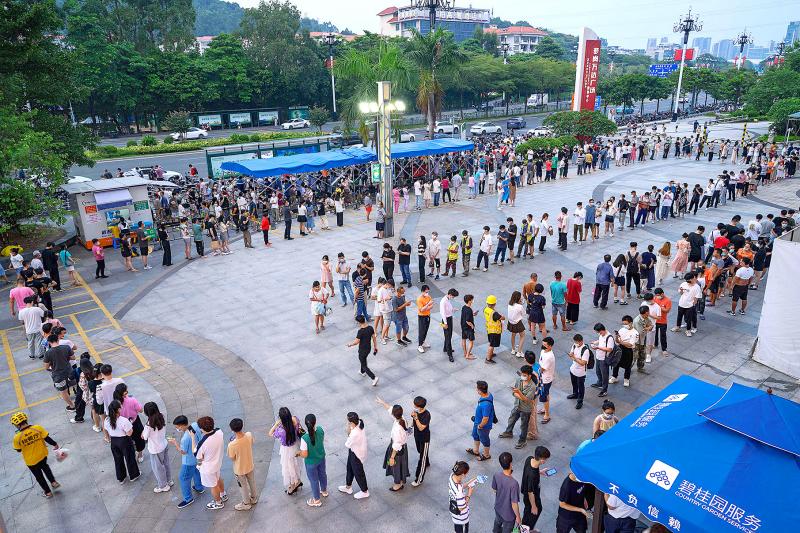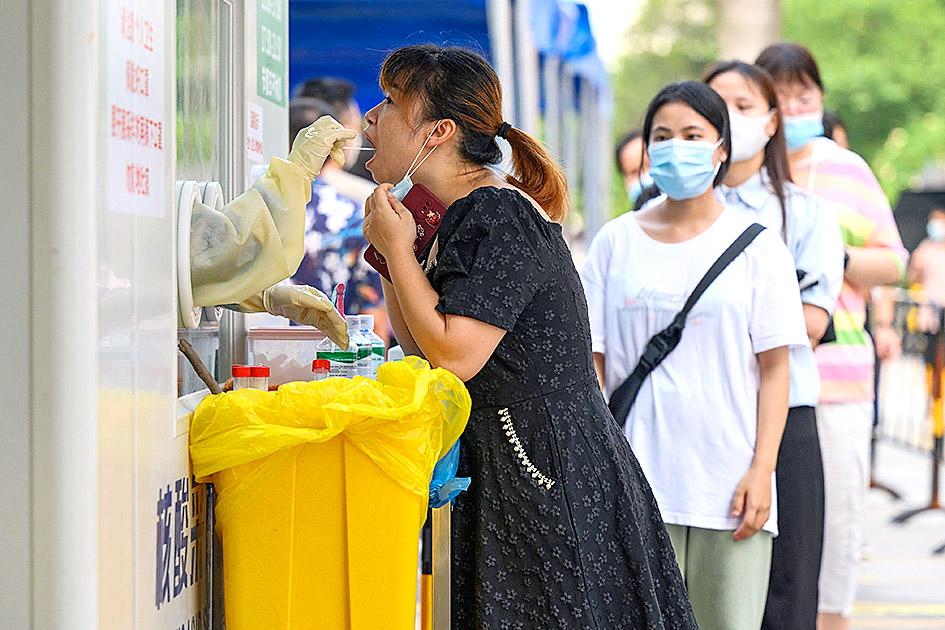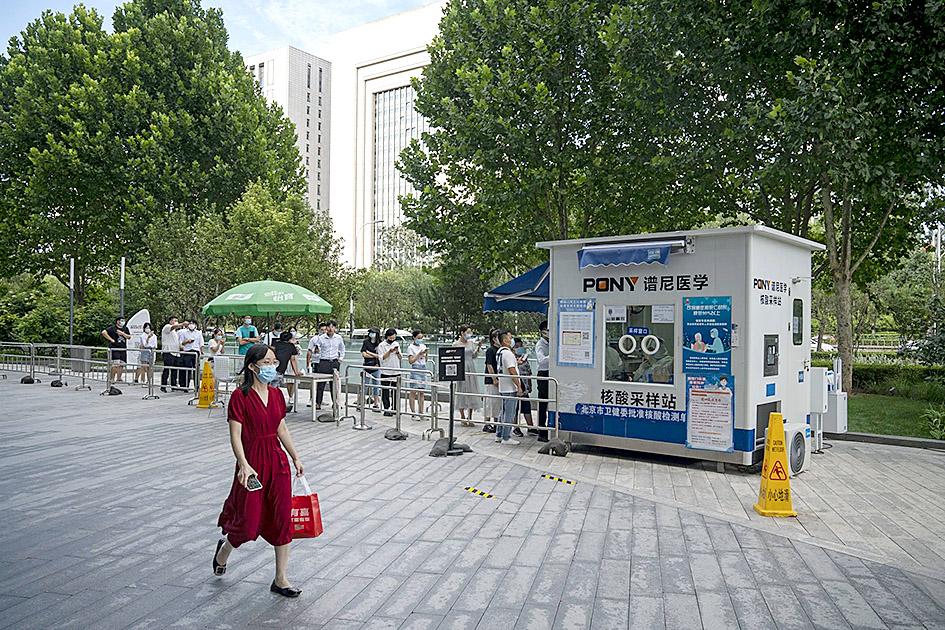When Zuo tested positive for COVID-19 while working as a cleaner in one of Shanghai’s largest quarantine centers, she hoped it wouldn’t be long before she could pick up the mop and start earning again.
But four months on, she is still fighting to get her job back — one of scores of recovering COVID patients facing what labor rights activists and health experts say is a widespread form of discrimination in zero-COVID China. Using snap lockdowns and mass testing, China is the last major economy still pursuing the goal of stamping out the virus completely.
Those who test positive, as well as their contacts, are all sent to central quarantine facilities, while a flare-up in a factory can grind production to a halt.

Photo: AFP
Rights groups say the strict rules are feeding COVID-related discrimination and shutting out thousands of people from China’s already bleak job market — with migrant workers and young people hit hardest.
“People are afraid they might contract the virus from us, so they shun us,” said Zuo, who only gave her last name for fear of retribution.“Recruiters check COVID testing history going back several months during an interview.”
China’s strict control measures have led to stigma against not just recovered patients, but also their families, neighbors, friends and even frontline healthcare workers, said Jin Dongyan (金冬雁) from the School of Biomedical Sciences at Hong Kong University.

Photo: AFP
“It is unscientific to think that people who were infected once will continue to carry the virus and be infectious long after recovering,” Jin said. “Due to the lack of awareness, some fear that those who have been infected are more susceptible to being reinfected, but in reality, it’s the opposite.”
Zuo is now fighting a court battle with her employer, who has refused to pay her wages since she got sick, and who cites her disease history as a reason to bar her from returning to work. Her employer, a service company named Shanghai Yuanmao BPO, declined to comment citing the pending court case.
‘TREATED LIKE A VIRUS’

Photo: Bloomberg
He Yuxiu is a Chinese social media influencer who goes by a pseudonym and was living in Ukraine until Russia invaded.
She fled the war and returned home, then found a job as a Russian-language teacher in northern China’s Hebei province, relieved to have left her troubles behind.
But when her school learned that she had been infected while in Ukraine, she was fired.
“I never imagined I’d lose my first job for this reason,” she said in a video posted on China’s Twitter-like Weibo. “Why should we be treated like a virus when we have defeated it?”
The stigma is widespread — job ads for factory workers in Shanghai posted last month said applicants with a history of COVID-19 infection would be refused work. The story of a young woman who lived in a toilet for weeks in Shanghai’s Hongqiao railway station since she was unable to find work or return to her village due to the stigma of having been infected went viral last month.
And a theater in the southern Chinese city of Foshan was forced to apologize after a notice banning recovered patients from entering sparked a public backlash.
DARK SITUATION
Beijing’s National Health Commission and human resources ministry last month banned employers from discriminating against recovered COVID-19 patients, while Premier Li Keqiang (李克強) has called for heavy punishments for those breaking the rules.
But job seekers and activists are skeptical.
Factories in Shanghai continued to refuse to hire recovered workers even after the city announced strict anti-discrimination rules, employment agent Wang Tao said, because they fear a mass outbreak or health inspections.
“Some factories give different excuses despite being short of workers,” Wang added.
“But all those who are turned down have tested positive in the past.”
Eight manufacturers named by Chinese state media as having engaged in discriminatory practices — including iPhone manufacturer Foxconn — were contacted for this story, but they declined to comment.
“It’s very difficult for workers to protect their rights since most employers offer different excuses and it is hard to prove that a labor law has been violated in these cases,” said Aidan Chau, a researcher for rights group China Labour Bulletin.
“It is important for labor unions to step up. But many small and medium factories don’t have one.”
Those who have tested positive are often referred to as “little sheep people” (小羊人)on Chinese social media. In Mandarin, the word for “positive” and “sheep” are pronounced the same way.
“It is very difficult for recovered patients to go back to our normal lives,” said Zuo, the cleaner from Shanghai.
“No matter where we go, our infection history will follow us like a dark shadow.”

Growing up in a rural, religious community in western Canada, Kyle McCarthy loved hockey, but once he came out at 19, he quit, convinced being openly gay and an active player was untenable. So the 32-year-old says he is “very surprised” by the runaway success of Heated Rivalry, a Canadian-made series about the romance between two closeted gay players in a sport that has historically made gay men feel unwelcome. Ben Baby, the 43-year-old commissioner of the Toronto Gay Hockey Association (TGHA), calls the success of the show — which has catapulted its young lead actors to stardom -- “shocking,” and says

The 2018 nine-in-one local elections were a wild ride that no one saw coming. Entering that year, the Chinese Nationalist Party (KMT) was demoralized and in disarray — and fearing an existential crisis. By the end of the year, the party was riding high and swept most of the country in a landslide, including toppling the Democratic Progressive Party (DPP) in their Kaohsiung stronghold. Could something like that happen again on the DPP side in this year’s nine-in-one elections? The short answer is not exactly; the conditions were very specific. However, it does illustrate how swiftly every assumption early in an

Inside an ordinary-looking townhouse on a narrow road in central Kaohsiung, Tsai A-li (蔡阿李) raised her three children alone for 15 years. As far as the children knew, their father was away working in the US. They were kept in the dark for as long as possible by their mother, for the truth was perhaps too sad and unjust for their young minds to bear. The family home of White Terror victim Ko Chi-hua (柯旗化) is now open to the public. Admission is free and it is just a short walk from the Kaohsiung train station. Walk two blocks south along Jhongshan

Francis William White, an Englishman who late in the 1860s served as Commissioner of the Imperial Customs Service in Tainan, published the tale of a jaunt he took one winter in 1868: A visit to the interior of south Formosa (1870). White’s journey took him into the mountains, where he mused on the difficult terrain and the ease with which his little group could be ambushed in the crags and dense vegetation. At one point he stays at the house of a local near a stream on the border of indigenous territory: “Their matchlocks, which were kept in excellent order,